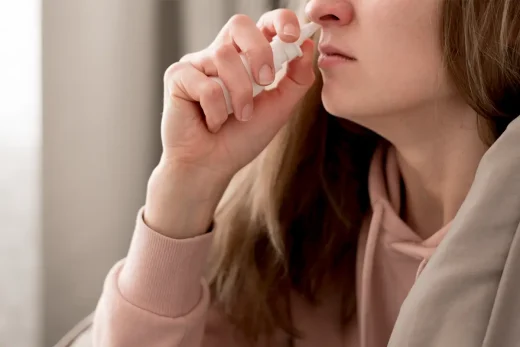One of the problems that adversely affect our daily lives is the complaint of postnasal drip caused by upper respiratory tract infections.
What is postnasal drip?
Postnasal-drip syndrome is the name given to the flow of inflammatory discharges from the nasal area, which provides the connection between the nose and the oral cavity, towards the larynx. While transparent discharges from the nasal passage do not cause any problems in the oral cavity and larynx, inflammatory discharges can lead to infection or deterioration in these areas. Although nasal drip is often seen as a symptom that develops after upper respiratory tract diseases, other important health problems can also lead to this complaint.
Causes of postnasal drip?
Special glands located on the surface of the respiratory in a healthy person are covered with mucous membranes. To protect the mucous tissues, mouth and nasal cavity surface, it cleans the substances taken into the body from the outside, such as breathing and nutrition, and makes it optimal for the body by heating and humidifying the air. Especially the mucous membrane, which is located in the nasal area and nasal cavity, provides humidification and purification of the air inhaled by the secretion it produces during the day.
Other postnasal drip causes include:
- eating overly spicy food
- smoke
- large adenoids or chronic adenoiditis
- some medications
- chronic respiratory conditions
- pregnancy
- reflux
- irritating chemicals from perfumes, cleaning products
Postnasal drip symptoms
There are certain symptoms in this health problem. However, it is unlikely that you will feel post nasal drip without runny nose. At the same time, nasal drip can also be seen as a complication of sore throat. People who develop nasal discharge often have additional symptoms depending on the underlying health problem. Accordingly, the following symptoms often accompany nasal discharge:
- a sore or scratchy throat
- feelings of nausea due to extra mucus in the stomach
- bad breath
- a cough that worsens at night
- frequently clearing the throat
- excessive spitting up or swallowing mucus
Chronic post nasal drip

Post-nasal drops occur when your body produces too much mucus. However, it occurs when mucus is not effectively drained. It is also a common symptom of colds and other respiratory infections or allergies. Many people experience post-nasal drips from time to time. However, if you have a permanent runny nose, this problem has become chronic. For postnasal drip syndrome treatment, your doctor will investigate the main factor that causes this problem. As a result, it applies cause-oriented treatment.
Postnasal drip treatment
In the medicine for postnasal drip, it is necessary to diagnose the main cause that leads to this problem. For this reason, your doctor first questions your family history. He then conducts a detailed physical examination. At the end of these evaluations, your doctor may order additional imaging and laboratory tests if necessary. In the light of all these, the diagnosis is confirmed based on the data obtained. Your doctor then plans the most appropriate post nasal drip treatment for you.
Apart from post nasal drip medicine, there are various practices and precautions that can be done at home in the elimination of nasal discharge:
- Salt water or ocean water content nosewash solutions can often be used during the day.
- The consumption of very spicy foods should be avoided.
- Harmful habits such as smoking should be stopped.
- It is useful to keep the ambient air warm and moisten it frequently.
- Consuming plenty of fluids and taking hot drinks such as soup and tea in case of nasal discharge is helpful in eliminating the complaint.
- When lying down in case of nasal discharge, supporting the head so that it remains elevated or using a double pillow is effective in improving sleep quality and preventing the spread of nasal discharge to surrounding tissues.
- In order to eliminate the reflux complaint that may be confused with nasal discharge, it is useful to pay attention to the eating habit, to lose weight and to use drugs that regulate stomach acid when deemed necessary.
Best medicine for post nasal drip
The best treatment to eliminate this problem is post nasal drip remedies that your doctor prescribes for you. However, antihistamines can be effective for getting rid of postnasal drip.
Homeopathy treatment for postnasal drip
This treatment is a very safe and successful treatment for nasal discharge. The body uses the immune system to destroy the infection. Since the postnasal drip homeopathy drugs are natural, they do not contain toxins. This, in turn, eliminates the possibility of developing an allergic reaction.